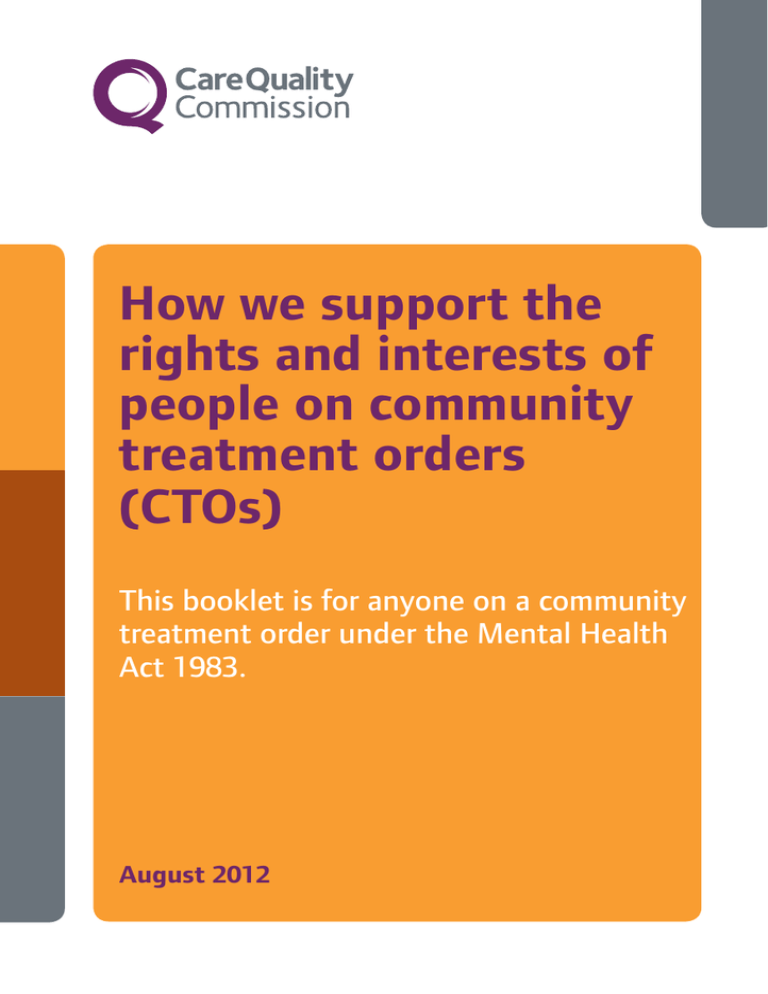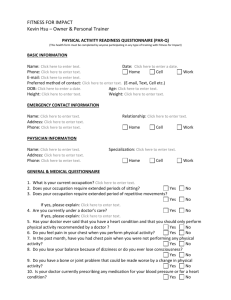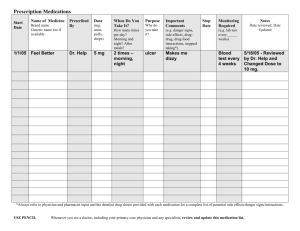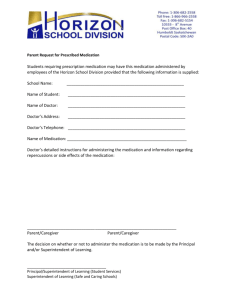How we support the rights and interests of people on community treatment orders
advertisement

How we support the rights and interests of people on community treatment orders (CTOs) This booklet is for anyone on a community treatment order under the Mental Health Act 1983. August 2012 About this booklet If you are receiving treatment as part of a community treatment order (CTO) under the Mental Health Act, you have a right to meet one of our Mental Health Act Commissioners when we are next visiting your area. This booklet explains what you can expect from us and tells you your rights about taking medication and how to complain about your treatment if you need to. About us We are the Care Quality Commission (CQC), the independent regulator of health and adult social care in England. We protect the interests of people whose rights are restricted under the Mental Health Act. We make sure that mental health law is used correctly and that patients are cared for properly while they are detained in hospital or are on a community treatment order. 3 How to meet one of our Mental Health Act Commissioners Our Commissioners have a very good knowledge of the Mental Health Act and of mental health services. They come from different backgrounds and include doctors, nurses, social workers, lawyers, psychologists, and other people who use, or have used, mental health services themselves. When our Commissioners are due to visit your area, the hospital that discharged you will get in touch with you to ask if you would like to speak to a Commissioner. If you do want to meet a Commissioner, you need to make an appointment through the hospital. Our Commissioners cannot come to speak to you at your home. 4 What to expect when our Commissioner visits your area If you’d like to speak to one of our Commissioners when they visit your area, they will meet you in private. The Commissioner will also meet with managers and other members of staff who are treating you during your community treatment order. This is so they can discuss things that affect your care and treatment and raise any issues that might be troubling you. The Commissioner will check that: zz zz zz zz zz your community treatment order was made correctly; you know what your rights are under the Mental Health Act and they have been explained to you in a way you can understand; staff respect your privacy and dignity; staff respect your cultural background, sex, age, sexual orientation (whether you are heterosexual, lesbian, gay or bisexual), religion or belief or any disability you may have; and the decisions the hospital makes about your treatment follow the guidance for professionals set out in the Mental Health Act code of practice. 5 What our Commissioners cannot do There are some things that the law does not allow us to do. Our Mental Health Act Commissioners are not able to: zz zz zz discharge you from your community treatment order under the Mental Health Act; offer you individual medical advice; or offer you individual legal advice. But our Commissioners can tell you who to contact for advice about these issues. Independent Mental Health Advocates While you are receiving treatment as part of a community treatment order, you have a legal right to support from an Independent Mental Health Advocate. These people are specialist mental health advocates. They can help you find out more about your rights and how to use them. If you would like to talk to an Independent Mental Health Advocate, please speak to your treating team. 6 Your rights about consent to medication The Mental Health Act code of practice explains that ‘consent to treatment’ is when a patient gives their permission for a doctor to treat them and they understand why they need the treatment, how it will be given, if there are any side effects or risks, the chances of success and if there are any other choices available. If a person gives permission when they have been put under any unfair or undue pressure, this is not proper consent. If you would like to see the code of practice, ask your care coordinator for a copy or download a copy from the Department of Health’s website at www.dh.gov.uk. When you were detained in hospital, your doctor had the legal power to insist that you take your medication even if you refused to give your consent to it, or were too ill to give proper consent. Now that you are on a community treatment order (CTO), your doctor still has the legal power to give you medication if you consent to take it, or if you are still too ill to consent. However, the rules are different if you are able to give consent but you refuse to do so. If you refuse your medication, your doctor cannot force you to take it while you are in the community. However, if you do refuse your medication, your doctor may recall you to hospital and make you take the medication there if they are worried that you might become unwell without the treatment. 7 If you agree to continue to take the medication at first, you can change your mind at any time. It is best to talk to your doctor before you do so. If you have talked to your doctor but you still don’t want to take your medication, you can refuse and you cannot be forced to take it, unless you are recalled to hospital. If you still give your consent to your medication after the first month of CTO, your doctor will fill in a certificate to confirm that you give consent, but you may still withdraw your consent at any time. If you are too unwell to be able to give consent to your medication after the first month of CTO, your doctor needs to have a certificate from an independent expert called a Second Opinion Appointed Doctor (SOAD) to be able to continue giving it to you. 8 What to expect from the Second Opinion Appointed Doctor (SOAD) If you need to be examined by a Second Opinion Appointed Doctor, he or she will do the following: zz zz zz discuss the medication with you. Normally this will be in private, unless you want someone else there as well. If you need an interpreter or signer, the hospital you were discharged from will provide one; speak to your doctor and to two other professionals who have been involved in your care and treatment; decide whether or not you need to continue to receive the medication. If the Second Opinion Appointed Doctor agrees that you should continue with all of your medication, or just some of it, they must fill in a certificate confirming this and describing the medication. Your doctor needs this certificate to continue with your treatment unless you are able and willing to consent to it yourself. Your own doctor will tell you what the Second Opinion Appointed Doctor decides. The Second Opinion Appointed Doctor is independent of the hospital, and the decision they make is a personal clinical decision. You cannot appeal to us if you disagree with the decision. 9 Very urgent situations In some very urgent situations, the above rules about certificates don’t apply. The Mental Health Act allows a doctor to give medication for a mental disorder to a patient on a community treatment order without their consent if the treatment is needed to: zz zz zz zz 10 save their life; reduce their serious suffering; stop their condition from getting much worse; or stop them from behaving violently or being a danger to themselves or to other people. What to do if you want to complain If you are, or were, on a community treatment order under the Mental Health Act, and you have a complaint about something that happened during this time, you must first ask the managers of your hospital to investigate the complaint for you. zz zz You should write or speak to the Complaints Officer at the hospital you were discharged from or ask somebody to do this on your behalf. (Every hospital has a Complaints Officer.) If you find it difficult to make your complaint, the hospital should have an advocacy service that will be able to help you (this may be the Independent Mental Health Advocate or another advocate), or you can ask one of our visiting Commissioners to help you. The hospital managers will try to sort out your complaint. They will let you know what they found and tell you about any action that they plan to take to put things right. If you are not satisfied with the hospital’s response, you can ask us to investigate. Contact us at the address at the back of this booklet. If you are not satisfied with the hospital’s response, you can also ask the Parliamentary and Health Service Ombudsman to look into your complaint. To contact the Ombudsman, phone 0345 015 4033 or write to: The Parliamentary and Health Service Ombudsman, Millbank Tower, Millbank, London SW1P 4QP. 11 How we will deal with your complaint We have the power to investigate complaints that relate to your treatment under the Mental Health Act. Our role as regulator means that we do not settle individual complaints that concern any other failure to meet government standards of quality and safety. If you have a complaint about these, you, or someone acting on your behalf, should read our booklet ‘How to complain about a health care or social care service’. You can also share your experience with us on our website at www.cqc.org. uk/public/sharing-your-experience. If your complaint is about your treatment under the Mental Health Act, we will need firstly to look at the results of the hospital’s own investigation into your complaint. We will carry out a detailed assessment of your complaint and your hospital’s response. If we agree that your hospital has failed to sort out your complaint, we will decide whether to carry out our own investigation into the matter. At the end of our investigation, we will send you a letter telling you what we have found out. This may include our recommendations to your hospital on what they should do to prevent such a failing happening again to anyone on a community treatment order. 12 Your personal information If you have been in contact with a Mental Health Act Commissioner in the past, we may hold personal information about you. Under the Data Protection Act, you have the right to ask us: zz zz zz zz what personal information we hold about you; who has access to your personal information; why we hold your information and how it is used; and to correct any inaccurate information. If you would like to see details of the personal information that we may hold about you, please write to us at the address on the back of this booklet. 13 How to contact us If you would like to contact us, you (or a friend or relative on your behalf) can: zz zz write to our office in Newcastle (the address is on the back page of this booklet); or speak to someone in our office between 8.30am and 5.30pm from Monday to Friday by phoning 03000 616161 (choose option 1). If the office is closed, leave a message on our telephone answering service. Please leave your name, address and phone number so that someone can contact you on the next working day. Other publications in this series ‘How we support the rights and interests of people who are detained in hospital’ ‘Electro-convulsive therapy (ECT) – Your rights about consent to treatment’ 14 15 Get in touch Write to us at: CQC Mental Health Act Citygate Gallowgate Newcastle upon Tyne NE1 4PA Phone: 03000 616161 (choose option 1) Email: enquiries@cqc.org.uk Website: www.cqc.org.uk If you would like this booklet in a different language or format (for example in large print or easy-read or on audio CD) please visit our website www.cqc.org.uk or contact us using the details above. CQC-101-7000-STE-082012 © Care Quality Commission 2012







